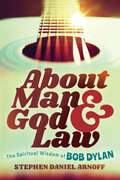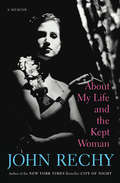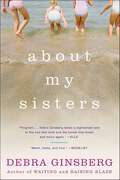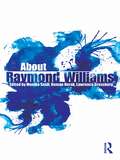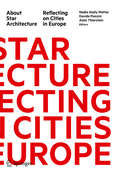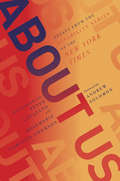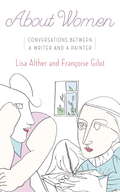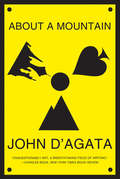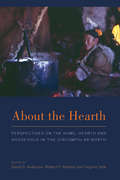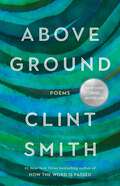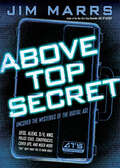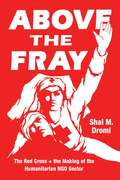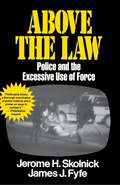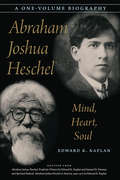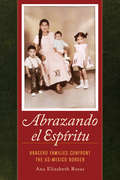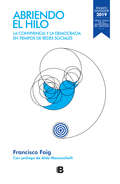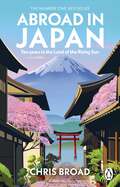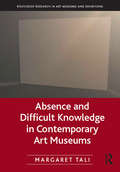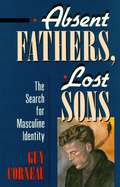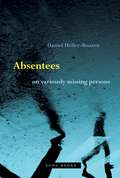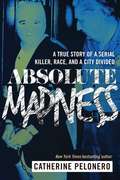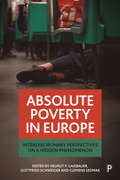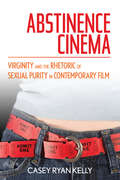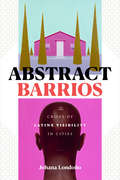- Table View
- List View
About Man and God and Law: The Spiritual Wisdom of Bob Dylan
by Stephen Daniel ArnoffAbout Man and God and Law is the story of how Bob Dylan sparked a revolution of the spirit and why it matters today.Many of our assumptions about empathy, sensual pleasure, and the essence of work, community, country, race, and the divine have germinated in Bob Dylan’s need to know what’s blowing in the wind and how it feels. Tracing his work and vision through themes that have shaped religious and cultural history for millennia, Stephen Daniel Arnoff uncovers how Bob Dylan has re-enchanted ancient questions of meaning and purpose throughout popular culture, inspiring a pantheon of prophetic musicians along the way. This field guide to Dylan's spiritual wisdom aims to make good on the promise that if we look closely enough at his body of work—precisely at a moment when the world we thought we knew seems like uncharted territory—we can open up our eyes to see not only where we really are, but where we need to go.
About My Life and the Kept Woman: A Memoir
by John RechyThe long-awaited memoir by &“one of the few original American writers of the last century&” is a testament to the power of self-acceptance (Gore Vidal). John Rechy, author of City of Night and The Sexual Outlaw, has always known discrimination. Raised Mexican-American in El Paso, Texas, at a time when Latino children were routinely segregated, Rechy was often assumed to be Anglo because of his light skin, and had his name &“changed&” for him by a teacher, from Juan to John. As he grew older—and as his fascination with the memory of a notorious kept woman in his childhood deepened—Rechy became aware that his differences lay not just in his heritage, but in his sexuality. While he performed the roles expected of him by others—the authoritarians in the US Army during the Korean War, the bigoted relatives of his Anglo college classmates, or the men and women who wanted him to be something he was not—he never allowed them to define him. The &“riveting&” story of a life that bears witness to some of the most riotous changes of the past century, About My Life and the Kept Woman is as much a portrait of intolerance as of an individual who defied it to forge his own path (The Advocate). &“Rechy might be called the first bard of West Hollywood.&” —The New York Times &“A skillfully paced story . . . As a memoirist, Rechy is both participant and observer, and he segues as easily between narrative and exegesis as his younger self did between the lure of the wild streets and the embrace of his traditional family.&” —Los Angeles Magazine
About My Sisters
by Debra GinsbergOn the heels of her poignant and critically acclaimed memoirs, Waiting and Raising Blaze, Debra Ginsberg explores the unique connection she shares with her three sisters.In About My Sisters, Ginsberg examines the special bond she shares with her three sisters, May, Lavander and Deja. As her hippie parents criss-crossed the globe, Debra, the oldest of five children, formed indelible bonds with her three sisters that last to this day. Separated by fifteen years among them, Debra and her sisters represent two different generations, each one of them having something to teach the other. Debra and Maya (the next oldest) became not only babysitters, but also playmates, problem solvers, teachers and surrogate mothers to the youngest two. And the shared experience of being the children of an unconventional, dope-smoking, non-career oriented, nomadic couple bonded them even more. Structured around the course of one year, About My Sisters examines these bonds through the prism of the events of that year, revealing not only a "different" family, but also a unique and amazing relationship that has weathered many storms but never foundered. The four sisters (as well as their parents and brother) still live within ten miles of one another and share meals, holidays, joys, pains, and babysitting duties with an astounding frequency. This is a heart-warming, funny, and poignant look at a family that's much like the one we all wish we had..
About Raymond Williams
by Lawrence Grossberg Monika Seidl Roman HorakAbout Raymond Williams represents the overdue critical acclaim of Williams’ lasting influence and unbroken repercussions in critical thought. His writings have effectively shaped the ways in which people understand the complexity of the notion of 'culture' and many of the ways it has been taken up in scholarly practice.
About Star Architecture: Reflecting on Cities in Europe
by Davide Ponzini Alain Thierstein Nadia Alaily-MattarCities across the world have been resorting to star architects to brand their projects, spark urban regeneration and market the city image internationally. This book shifts the attention from star architects to star architecture, arguing that the process of deciding about and implementing relevant architectural and urban projects is not the product of any single actor. Star architecture can, in fact, be better studied and understood as assembled by multiple actors and in its relationship with urban transformation. In its 18 chapters, the book presents a multidisciplinary collection of expert contributions in the fields of urban planning, architecture, media studies, urban economics, geography, and sociology, consistently brought together for the first time to deal with this topic. Through a vast array of case studies and analytical techniques touching over 20 cities in Europe, the book shows the positive and more problematic impacts of star architecture with reference to the preservation of built heritage, tourism and media. The book will be of interest to architects, sociologists, urban planners, and public administrators.
About Us: Essays From The New York Times' Disability Series
by Rosemarie Garland-Thomson Peter CatapanoBased on the pioneering New York Times series, About Us collects the personal essays and reflections that have transformed the national conversation around disability. <P><P> Boldly claiming a space in which people with disabilities can be seen and heard as they are—not as others perceive them—About Us captures the voices of a community that has for too long been stereotyped and misrepresented. Speaking not only to those with disabilities, but also to their families, coworkers and support networks, the authors in About Us offer intimate stories of how they navigate a world not built for them. Since its 2016 debut, the popular New York Times’ “Disability” column has transformed the national dialogue around disability. Now, echoing the refrain of the disability rights movement, “Nothing about us without us,” this landmark collection gathers the most powerful essays from the series that speak to the fullness of human experience—stories about first romance, childhood shame and isolation, segregation, professional ambition, child-bearing and parenting, aging and beyond. <P><P>Reflecting on the fraught conversations around disability—from the friend who says “I don’t think of you as disabled,” to the father who scolds his child with attention differences, “Stop it stop it stop it what is wrong with you?”—the stories here reveal the range of responses, and the variety of consequences, to being labeled as “disabled” by the broader public. <P><P>Here, a writer recounts her path through medical school as a wheelchair user—forging a unique bridge between patients with disabilities and their physicians. An acclaimed artist with spina bifida discusses her art practice as one that invites us to “stretch ourselves toward a world where all bodies are exquisite.” With these notes of triumph, these stories also offer honest portrayals of frustration over access to medical care, the burden of social stigma and the nearly constant need to self-advocate in the public realm. <P><P>In its final sections, About Us turns to the questions of love, family and joy to show how it is possible to revel in life as a person with disabilities. Subverting the pervasive belief that disability results in relentless suffering and isolation, a quadriplegic writer reveals how she rediscovered intimacy without touch, and a mother with a chronic illness shares what her condition has taught her young children. With a foreword by Andrew Solomon and introductory comments by co-editors Peter Catapano and Rosemarie Garland-Thomson, About Us is a landmark publication of the disability movement for readers of all backgrounds, forms and abilities. <P><P>Topics Include: Becoming Disabled • Mental Illness is not a Horror Show • Disability and the Right to Choose • Brain Injury and the Civil Right We Don’t Think • The Deaf Body in Public Space • The Everyday Anxiety of the Stutterer • I Use a Wheelchair. And Yes, I’m Your Doctor • A Symbol for “Nobody” That’s Really for Everybody • Flying While Blind • My $1,000 Anxiety Attack • A Girlfriend of My Own • The Three-Legged Dog Who Carried Me • Passing My Disability On to My Children • I Have Diabetes. Am I to Blame? • Learning to Sing Again • A Disabled Life is a Life Worth Living
About Women
by Lisa Alther Francoise GilotA provocative and wide-ranging conversation between two distinctive women--one American and one French--on the dilemmas, rewards, and demands of womanhood.Lisa Alther and Françoise Gilot have been friends for more than twenty-five years. Although from different backgrounds (Gilot from cosmopolitan Paris, Alther from small-town Tennessee) and different generations, they found they have a great deal in common as women who managed to support themselves with careers in the arts while simultaneously balancing the obligations of work and parenthood. About Women is their extended conversation in which they talk about everything important to them: their childhoods, the impact of war on their lives and their work, and their views on love, style, self-invention, feminism, and child rearing. They also discuss the creative impulse and the importance of art as they ponder what it means to be a woman.From the Hardcover edition.
About a Mountain
by John D'Agata"Unquestionably art, a breathtaking piece of writing."--Charles Bock, The New York Times Book Review <P><P>When John D'Agata helps his mother move to Las Vegas one summer, he begins to follow a story about the federal government's plan to store nuclear waste at Yucca Mountain; the result is a startling portrait that compels a reexamination of the future of human life.
About the Hearth
by David G. Anderson Virginie Vate Robert P. WishartDue to changing climates and demographics, questions of policy in the circumpolar north have focused attention on the very structures that people call home. Dwellings lie at the heart of many forms of negotiation. Based on years of in-depth research, this book presents and analyzes how the people of the circumpolar regions conceive, build, memorialize, and live in their dwellings. This book seeks to set a new standard for interdisciplinary work within the humanities and social sciences and includes anthropological work on vernacular architecture, environmental anthropology, household archaeology and demographics.
Above Ground
by Clint SmithA remarkable poetry collection with "inextinguishable generosity and abundant wisdom" (Monica Youn) from Clint Smith, the #1 New York Times bestselling and National Book Critics Circle award-winning author of How the Word Is Passed. Clint Smith&’s vibrant and compelling new collection traverses the vast emotional terrain of fatherhood, and explores how becoming a parent has recalibrated his sense of the world. There are poems that interrogate the ways our lives are shaped by both personal lineages and historical institutions. There are poems that revel in the wonder of discovering the world anew through the eyes of your children, as they discover it for the first time. There are poems that meditate on what it means to raise a family in a world filled with constant social and political tumult. Above Ground wrestles with how we hold wonder and despair in the same hands, how we carry intimate moments of joy and a collective sense of mourning in the same body. Smith&’s lyrical, narrative poems bring the reader on a journey not only through the early years of his children&’s lives, but through the changing world in which they are growing up—through the changing world of which we are all a part.Above Ground is a breathtaking collection that follows Smith's first award-winning book of poetry, Counting Descent.
Above Top Secret: UFO's, Aliens, 9/11, NWO, Police State, Conspiracies, Cover Ups, and Much More "They" Don't Want You to Know About
by Jim MarrsA collection of the most stunning topics found on AboveTopSecret.com investigated by the renowned conspiracy theorist and author of Crossfire.Jim Marrs can justifiably be considered the world’s leading conspiracy author, with multimillion bestsellers like Alien Agenda, Rule by Secrecy, and the book that Oliver Stone used as a basis for his JFK movie, Crossfire: The Plot That Killed Kennedy.Now Marrs has allied with the web’s most popular conspiracy forum to investigate everything from chemtrails to the Nazis’ Antarctic base, moon landing hoaxes to UFOs, God as an alien to the end of the world in 2012. AboveTopSecret.com is the Internet’s largest and most popular discussion board community, with more than twelve million page views per month. It is dedicated to the intelligent exchange of ideas and debate on a wide range of “alternative topics” such as conspiracies, UFOs, paranormal, secret societies, political scandals, new world order, terrorism, and dozens of related topics. AboveTopSecret’s popular podcast is downloaded tens of millions of times per month.Marrs brings his rigorous journalist’s credentials to bear on these topics and more, asking (and often answering) the essential who, what, when, where, why, and how questions in compelling, page-turning fashion.
Above the Fray: The Red Cross and the Making of the Humanitarian NGO Sector
by Shai M. DromiFrom Lake Chad to Iraq, nongovernmental organizations (NGOs) provide relief around the globe, and their scope is growing every year. Policymakers and activists often assume that humanitarian aid is best provided by these organizations, which are generally seen as impartial and neutral. In Above the Fray, Shai M. Dromi investigates why the international community overwhelmingly trusts humanitarian NGOs by looking at the historical development of their culture. With a particular focus on the Red Cross, Dromi reveals that NGOs arose because of the efforts of orthodox Calvinists, demonstrating for the first time the origins of the unusual moral culture that has supported NGOs for the past 150 years. Drawing on archival research, Dromi traces the genesis of the Red Cross to a Calvinist movement working in mid-nineteenth-century Geneva. He shows how global humanitarian policies emerged from the Red Cross founding members’ faith that an international volunteer program not beholden to the state was the only ethical way to provide relief to victims of armed conflict. By illustrating how Calvinism shaped the humanitarian field, Dromi argues for the key role belief systems play in establishing social fields and institutions. Ultimately, Dromi shows the immeasurable social good that NGOs have achieved, but also points to their limitations and suggests that alternative models of humanitarian relief need to be considered.
Above the Law
by Skolnick FyfeThe now-famous videotape of the beating of Rodney King precipitated a national outcry against police violence. Skolnick and Fyfe, two of the nation's top experts on law enforcement, use the incident to introduce a revealing historical analysis of such violence and the extent of its survival in law enforcement today.
Abraham Joshua Heschel: Mind, Heart, Soul
by Edward K. KaplanIn this first one-volume English-language full biography of Abraham Joshua Heschel, Edward K. Kaplan tells the engrossing, behind-the-scenes story of the life, philosophy, struggles, yearnings, writings, and activism of one of the twentieth century&’s most outstanding Jewish thinkers. Kaplan takes readers on a soulful journey through the rollercoaster challenges and successes of Heschel&’s emotional life. As a child he was enveloped in a Hasidic community of Warsaw, then he went on to explore secular Jewish Vilna and cosmopolitan Berlin. He improvised solutions to procure his doctorate in Nazi-dominated Berlin, escaped the Nazis, and secured a rare visa to the United States. He articulated strikingly original interpretations of Jewish ideas. His relationships spanned not only the Jewish denominational spectrum but also Catholic and Protestant faith communities. A militant voice for nonviolent social action, he marched with Martin Luther King Jr. (who became a close friend), expressed strong opposition to the Vietnam War (while the FBI compiled a file on him), and helped reverse long-standing antisemitic Catholic Church doctrine on Jews (participating in a secret meeting with Pope Paul VI during Vatican II). From such prodigiously documented stories Heschel himself emerges—mind, heart, and soul. Kaplan elucidates how Heschel remained forever torn between faith and anguish; between love of God and abhorrence of human apathy, moral weakness, and deliberate evil; between the compassion of the Baal Shem Tov of Medzibozh and the Kotzker rebbe&’s cruel demands for truth. &“My heart,&” Heschel acknowledged, is &“in Medzibozh, my mind in Kotzk.&”
Abrazando el Espíritu
by Dr Ana Elizabeth RosasStructured to meet employers' needs for low-wage farm workers, the well-known Bracero Program recruited thousands of Mexicans to perform physical labor in the United States between 1942 and 1964 in exchange for remittances sent back to Mexico. As partners and family members were dispersed across national borders, interpersonal relationships were transformed. The prolonged absences of Mexican workers, mostly men, forced women and children at home to inhabit new roles, create new identities, and cope with long-distance communication from fathers, brothers, and sons. Drawing on an extraordinary range of sources, Ana Elizabeth Rosas uncovers a previously hidden history of transnational family life. Intimate and personal experiences are revealed to show how Mexican immigrants and their families were not passive victims but instead found ways to embrace the spirit (abrazando el espíritu) of making and implementing difficult decisions concerning their family situations--creating new forms of affection, gender roles, and economic survival strategies with long-term consequences.
Abriendo el hilo: La convivencia y la democracia en tiempos de redes sociales
by Francisco FaigEnsayo ganador 2019. Gran Logía de la Masonería del Uruguay. ¿Las redes sociales llegaron para mejorar la democracia con mayor participación ciudadana, superior debate político y más control sobre los gobernantes? ¿O nuestra convivencia social está peor por causa de los insultos, las mentiras y el malhumor cada vez más presentes en lainteracción de las redes? ¿Estamos poniendo en juego la calidad de nuestra democracia representativa que no logra adaptarse a este nuevo tiempo de las comunicaciones? Este ensayo responde a estas preguntas con herramientas conceptuales de la ciencia política, presentando la evolución y las características de las redes sociales, y dejando planteados problemas profundos que hacen a la nueva ciudadanía en el siglo XXI, a la diferente manera de leer e informarse que tienen sobre todo las generaciones más jóvenes, y a los particulares desafíos que todo esto implica para el espíritu democrático. Lo hace con erudición y evitando los lugares comunes que impiden una reflexión compleja. Pero sobre todo, lo hace con una pluma ágil que con facilidad conduce al lector por todos estos temas que son de gran actualidad.
Abroad in Japan: The No. 1 Sunday Times Bestseller
by Chris BroadTHE NUMBER ONE BESTSELLER'Chris Broad explores Japan in all its quirky glory..Endlessly fascinating!'Will Ferguson, author of Hokkaido Highway Blues'Carves a unique path across Japan bringing him into contact with far too many cats, heartening renewal in Tohoku, and even pizza with Ken Watanabe.'Iain Maloney, author of The Only Gaijin in the Village'Fascinating, fact-packed and very funny..An excellent and enjoyable read for the Japan-curious. I loved it and learned a lot.'Sam Baldwin, author of For Fukui's Sake: Two years in rural JapanWhen Englishman Chris Broad landed in a rural village in northern Japan he wondered if he'd made a huge mistake. With no knowledge of the language and zero teaching experience, was he about to be the most quickly fired English teacher in Japan's history?Abroad in Japan charts a decade of living in a foreign land and the chaos and culture clash that came with it. Packed with hilarious and fascinating stories, this book seeks out to unravel one the world's most complex cultures.Spanning ten years and all forty-seven prefectures, Chris takes us from the lush rice fields of the countryside to the frenetic neon-lit streets of Tokyo. With blockbuster moments such as a terrifying North Korean missile incident, a mortifying experience at a love hotel and a week spent with Japan's biggest movie star, Abroad in Japan is an extraordinary and informative journey through the Land of the Rising Sun.Number one Sunday Times bestseller, August 2023
Absence and Difficult Knowledge in Contemporary Art Museums (Routledge Research in Art Museums and Exhibitions)
by Margaret TaliThis book analyzes practices of collecting in European art museums from 1989 to the present, arguing that museums actualize absence both consciously and unconsciously, while misrepresentation is an outcome of the absent perspectives and voices of minority community members which are rarely considered in relation to contemporary art. Difficult knowledge is proposed as a way of dealing with absence productively. Drawing on social art history, museology, postcolonial theory, and memory studies, Margaret Tali analyzes the collections of four modern and contemporary art museums across Europe: the Hamburger Bahnhof in Berlin, the Ludwig Museum of Contemporary Art in Budapest, the Kiasma Museum in Helsinki, and the Kumu Museum in Tallinn.
Absent Citizens
by Michael J. PrinceDisability exists in the shadows of public awareness and at the periphery of policy making. People with disabilities are, in many respects, missing from the theories and practices of social rights, political participation, employment, and civic membership. Absent Citizens brings to light these chronic deficiencies in Canadian society and emphasizes the effects that these omissions have on the lives of citizens with disabilities.Drawing together elements from feminist studies, political science, public administration, sociology, and urban studies, Michael J. Prince examines mechanisms of exclusion and inclusion, public attitudes on disability, and policy-making processes in the context of disability. Absent Citizens also considers social activism and civic engagements by people with disabilities and disability community organizations, highlighting presence rather than absence and advocating both inquiry and action to ameliorate the marginalization of an often overlooked segment of the Canadian population.
Absent Fathers, Lost Sons: The Search For Masculine Identity (C. G. Jung Foundation Bks.)
by Guy CorneauAn experience of the fragility of conventional images of masculinity is something many modern men share. Psychoanalyst Guy Corneau traces this experience to an even deeper feeling men have of their fathers' silence or absence—sometimes literal, but especially emotional and spiritual. Why is this feeling so profound in the lives of the postwar "baby boom" generation—men who are now approaching middle age? Because, he says, this generation marks a critical phase in the loss of the masculine initiation rituals that in the past ensured a boy's passage into manhood. In his engaging examination of the many different ways this missing link manifests in men's lives, Corneau shows that, for men today, regaining the essential "second birth" into manhood lies in gaining the ability to be a father to themselves—not only as a means of healing psychological pain, but as a necessary step in the process of becoming whole.
Absentees: On Variously Missing Persons
by Daniel Heller-RoazenAn intellectually adventurous account of the role of nonpersons that explores their depiction in literature and challenges how they are defined in philosophy, law, and anthropology In thirteen interlocking chapters, Absentees explores the role of the missing in human communities, asking an urgent question: How does a person become a nonperson, whether by disappearance, disenfranchisement, or civil, social, or biological death? Only somebody can become a “nobody,” but, as Daniel Heller-Roazen shows, the ways of being a nonperson are as diverse and complex as they are mysterious and unpredictable. Heller-Roazen treats the variously missing persons of the subtitle in three parts: Vanishings, Lessenings, and Survivals. In each section and with multiple transhistorical and transcultural examples, he challenges the categories that define nonpersons in philosophy, ethics, law, and anthropology. Exclusion, infamy, and stigma; mortuary beliefs and customs; children’s games and state censuses; ghosts and “dead souls” illustrate the lives of those lacking or denied full personhood. In the archives of fiction, Heller-Roazen uncovers figurations of the missing—from Helen of Argos in Troy or Egypt to Hawthorne’s Wakefield, Swift’s Captain Gulliver, Kafka’s undead hunter Gracchus, and Chamisso’s long-lived shadowless Peter Schlemihl. Readers of The Enemy of All and No One’s Ways will find a continuation of those books’ intense intellectual adventures, with unexpected questions and arguments arising every step of the way. In a unique voice, Heller-Roazen’s thought and writing capture the intricacies of the all-too-human absent and absented.
Absolute Madness: A True Story of a Serial Killer, Race, and a City Divided
by Catherine PeloneroAbsolute Madness tells the disturbing true story of Joseph Christopher, a white serial killer who targeted black males and struck fear into the residents of New York in the 1980s. Dubbed both the 22-Caliber Killer and the Midtown Slasher, Christopher allegedly claimed eighteen victims during a savage four-month spree across the state. The investigation, aided by famed FBI profiler John Douglas, drew national attention and biting criticism from Jesse Jackson and other civil rights leaders. The killer, when at last he was unmasked, seemed an unlikely candidate to have held New York in a grip of terror. His capture was neither the end of the story nor the end of the racial strife, which flared anew during circuitous prosecutions and judicial rulings that prompted cries of a double standard in the justice system. Both a wrenching true crime story and an incisive portrait of dangerously discordant race relations in America, Absolute Madness also chronicles a lonely, vulnerable man’s tragic descent into madness and the failure of the American mental health system that refused his pleas for help.
Absolute Poverty in Europe: Interdisciplinary Perspectives on a Hidden Phenomenon
by Helmut P. Gaisbauer, Gottfried Schweiger and Clemens SedmakEngaging systematically with severe forms of poverty in Europe, this important book stimulates academic, public and policy debate by shedding light on aspects of deprivation and exclusion of people in absolute poverty in affluent societies. It examines issues such as access to health care, housing and nutrition, poverty related shame, and violence. The book investigates different policy and civic responses to extreme poverty, ranging from food donations to penalisation and “social cleansing” of highly visible poor and how it is related to concerns of ethics, justice and human dignity.
Abstinence Cinema: Virginity and the Rhetoric of Sexual Purity in Contemporary Film
by Casey Ryan KellyFrom the perspective of cultural conservatives, Hollywood movies are cesspools of vice, exposing impressionable viewers to pernicious sexually-permissive messages. Offering a groundbreaking study of Hollywood films produced since 2000, Abstinence Cinema comes to a very different conclusion, finding echoes of the evangelical movement's abstinence-only rhetoric in everything from Easy A to Taken. Casey Ryan Kelly tracks the surprising sex-negative turn that Hollywood films have taken, associating premarital sex with shame and degradation, while romanticizing traditional nuclear families, courtship rituals, and gender roles. As he demonstrates, these movies are particularly disempowering for young women, concocting plots in which the decision to refrain from sex until marriage is the young woman's primary source of agency and arbiter of moral worth. Locating these regressive sexual politics not only in expected sites, like the Twilight films, but surprising ones, like the raunchy comedies of Judd Apatow, Kelly makes a compelling case that Hollywood films have taken a significant step backward in recent years. Abstinence Cinema offers close readings of movies from a wide spectrum of genres, and it puts these films into conversation with rhetoric that has emerged in other arenas of American culture. Challenging assumptions that we are living in a more liberated era, the book sounds a warning bell about the powerful cultural forces that seek to demonize sexuality and curtail female sexual agency.
Abstract Barrios: The Crises of Latinx Visibility in Cities
by Johana LondoñoIn Abstract Barrios Johana Londoño examines how Latinized urban landscapes are made palatable for white Americans. Such Latinized urban landscapes, she observes, especially appear when whites feel threatened by concentrations of Latinx populations, commonly known as barrios. Drawing on archival research, interviews, and visual analysis of barrio built environments, Londoño shows how over the past seventy years urban planners, architects, designers, policy makers, business owners, and other brokers took abstracted elements from barrio design—such as spatial layouts or bright colors—to safely “Latinize” cities and manage a long-standing urban crisis of Latinx belonging. The built environments that resulted ranged from idealized notions of authentic Puerto Rican culture in the interior design of New York City’s public housing in the 1950s, which sought to diminish concerns over Puerto Rican settlement, to the Fiesta Marketplace in downtown Santa Ana, California, built to counteract white flight in the 1980s. Ultimately, Londoño demonstrates that abstracted barrio culture and aesthetics sustain the economic and cultural viability of normalized, white, and middle-class urban spaces.
